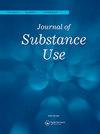Importance of perceived social support for HIV/AIDS patients in Pakistan: a collectivist society
IF 0.6
4区 医学
Q4 SUBSTANCE ABUSE
引用次数: 0
Abstract
ABSTRACTBackground Research related to HIV stigma is in its initial stages in Pakistan. With the recent increase in HIV cases among injection drug users, there is a growing need to study the psychosocial aspects of the disease to address and mitigate the factors associated with stigma. HIV stigma has been identified as a contributor to depression and a barrier to effective treatment.Aim This study examines the moderating role of perceived social support from three sources, i.e., family, friends, and significant others, in reducing the impact of HIV stigma on depression among individuals living with HIV in Pakistan.Methodology 150 male HIV patients were approached whose likely mode of infection was through injection drug usage. The study explored the moderating role of three sources of perceived social support. Semi-structured interviews and standardized measurements were employed to assess levels of stigma, depression, and perceived social support.Results The findings indicated that family support emerged as the most effective moderating factor in the relationship between HIV/AIDS stigma and depression. Support from significant others was observed as the second one. However, the study did not find substantial moderating effects from friends’ support on the relationship between stigma and depression.Conclusion In Pakistan, where a collectivist societal structure prevails, interventions to reduce HIV/AIDS stigma should focus on strengthening the family support system for patients. The study’s outcomes underscore the importance of tailored interventions that consider the cultural context to mitigate the adverse impact of HIV stigma on mental health of people living with HIV.KEYWORDS: HIV/AIDS stigma in Pakistanperceived social support in Pakistanstigma in a collectivist societydepressionsubstance use disorder Disclosure statementNo potential conflict of interest was reported by the author(s).Additional informationFundingThe author(s) reported there is no funding associated with the work featured in this article.巴基斯坦的集体主义社会对艾滋病毒/艾滋病患者的感知社会支持的重要性
【摘要】背景在巴基斯坦,与HIV病耻感相关的研究尚处于起步阶段。随着最近注射吸毒者中艾滋病毒病例的增加,越来越需要研究这种疾病的社会心理方面,以处理和减轻与耻辱有关的因素。艾滋病毒耻辱已被确定为抑郁症的一个因素和有效治疗的障碍。目的本研究考察来自三个来源的感知社会支持,即家庭、朋友和重要他人,在减少巴基斯坦艾滋病毒感染者艾滋病毒耻辱感对抑郁的影响方面的调节作用。方法对150例以注射吸毒为感染途径的男性HIV患者进行分析。本研究探讨了感知社会支持的三种来源的调节作用。采用半结构化访谈和标准化测量来评估耻辱感、抑郁和感知社会支持的水平。结果家庭支持是影响HIV/AIDS病耻感与抑郁之间关系的最有效调节因素。重要他人的支持是第二个因素。然而,这项研究并没有发现朋友的支持对耻辱和抑郁之间的关系有实质性的调节作用。在集体主义社会结构盛行的巴基斯坦,减少艾滋病毒/艾滋病污名的干预措施应侧重于加强对患者的家庭支持系统。这项研究的结果强调了有针对性的干预措施的重要性,这些干预措施考虑了文化背景,以减轻艾滋病毒耻辱对艾滋病毒感染者心理健康的不利影响。关键词:巴基斯坦的艾滋病毒/艾滋病耻辱感;巴基斯坦的感知社会支持;集体主义社会中的耻辱感;抑郁;药物使用障碍披露声明作者未报告潜在的利益冲突。其他信息资金作者报告没有与本文所述工作相关的资金。
本文章由计算机程序翻译,如有差异,请以英文原文为准。
求助全文
约1分钟内获得全文
求助全文
来源期刊

Journal of Substance Use
SUBSTANCE ABUSE-
CiteScore
1.60
自引率
0.00%
发文量
129
期刊介绍:
Journal of Substance Use is a bimonthly international journal, publishing peer-reviewed, up-to-the-minute articles on a wide spectrum of issues relating to the use of legal and illegal substances. The Journal aims to educate, inform, update and act as a forum for standard setting for health and social care professionals working with individuals and families with substance use problems. It also informs and supports those undertaking research in substance use, developing substance use services, and participating in, leading and developing education and training programmes.
 求助内容:
求助内容: 应助结果提醒方式:
应助结果提醒方式:


